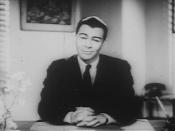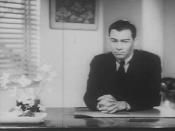In the novel The Secret Sharer, by Joseph Conrad, a man at sea struggles with loneliness and moral dilemma. However, the narrator has saved himself on multiple levels by the end of the novel. His confidence grows as he learns about himself, as well as when he learns of Leggatt, a man much like him. Throughout the novel, Conrad uses symbolism and the thoughts of the protagonist in order to suggest that one must know oneself in order to possess a life with motivation and confidence in oneself.
On many occasions, Conrad uses Leggatt as a mirror of the narrator, enabling the narrator to become more familiar with himself. When the narrator states, "I had become so connected in thoughts and impressions with the secret sharer of my cabin that I felt as if I, personally, were being given to understand that I, too, was not the sort that would have done for the chief mate of a ship like the Sephora."
he seems to find similarity between himself and Leggatt. In another instance, Leggatt admits to the narrator that he is a murderer. The narrator states that he "knew well enough...that [his] double was no homicidal ruffian." The narrator has no fear of Leggatt because he feels familiar with Leggatt, and as he reveals this contemplation, he shows a change in character and a development in confidence in himself.
As the narrator becomes confident that he has saved his "double", he becomes more confident in himself and his ability to command the ship. While Leggatt is still onboard, the narrator shtates, "...I was a total stranger to the ship." By acknowledging that he does not yet have a feel for how the ship maneuvers, the narrator displays a lack of self-confidence. After Leggatt leaves, the captain...


